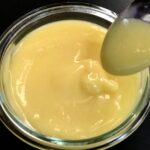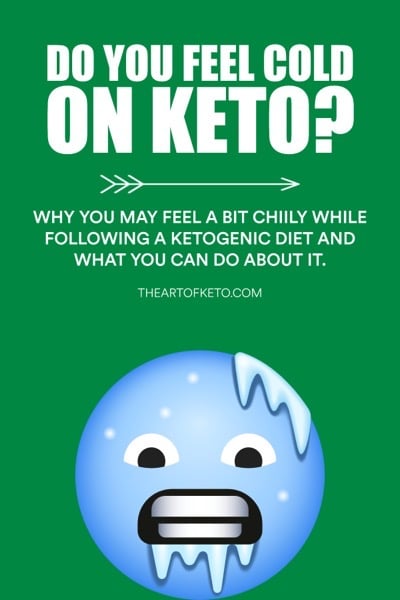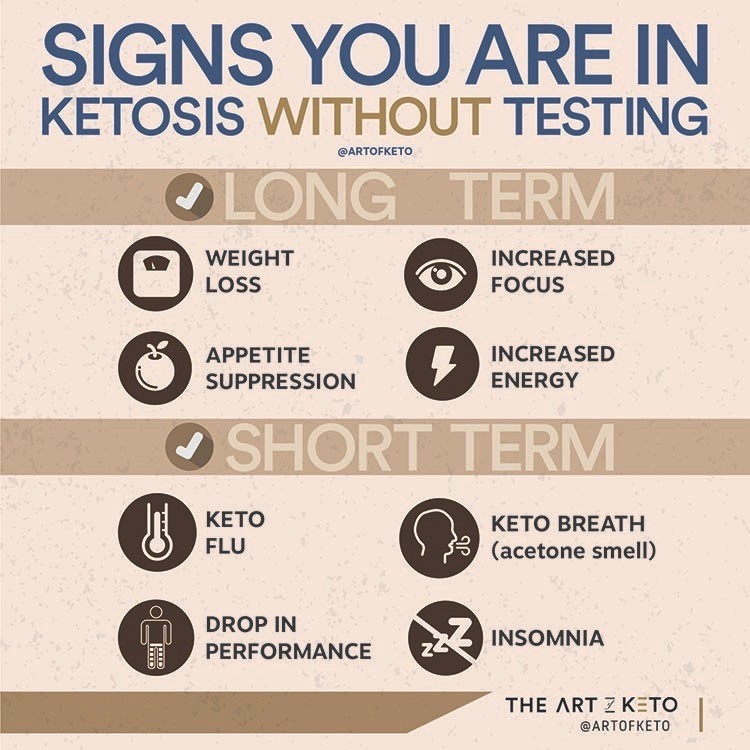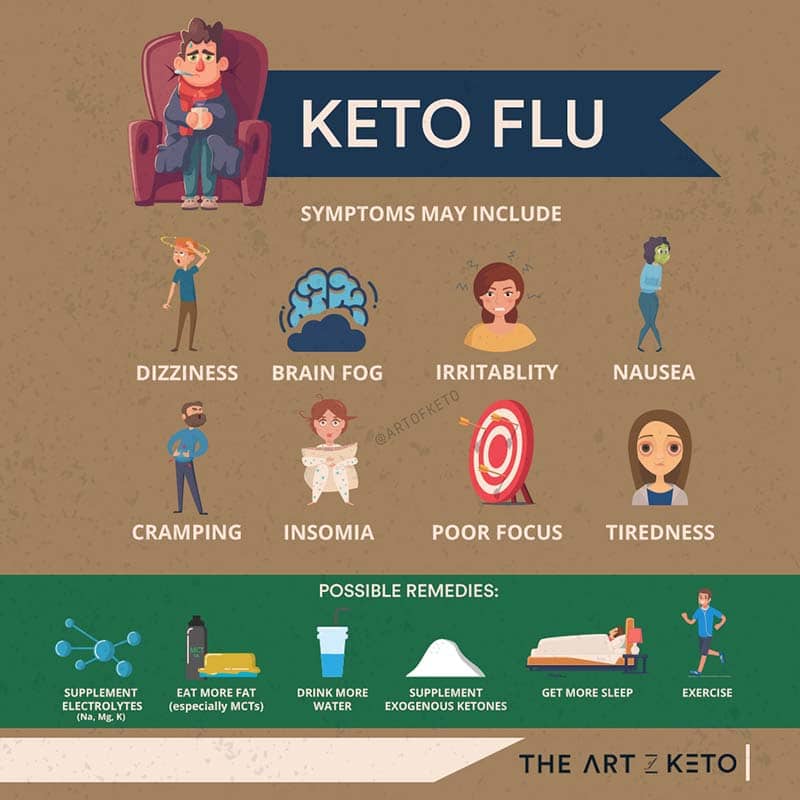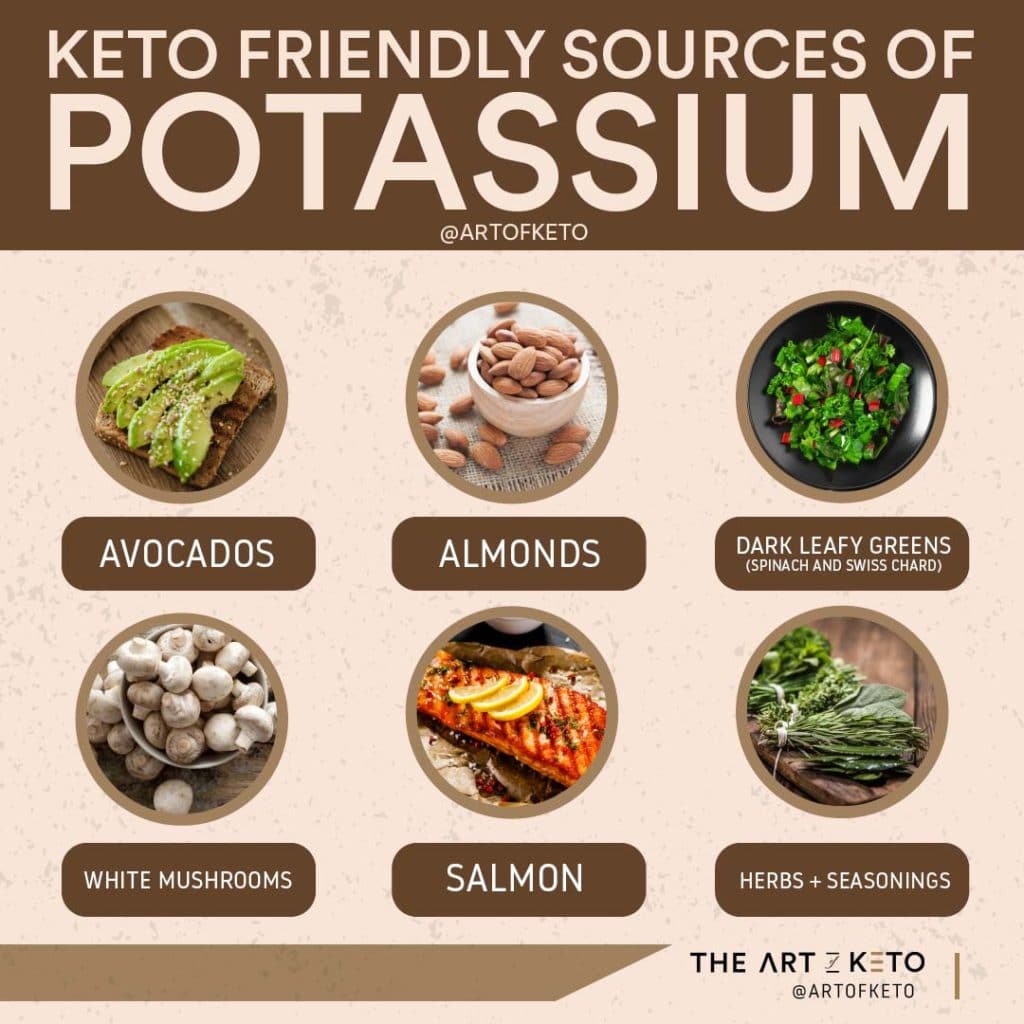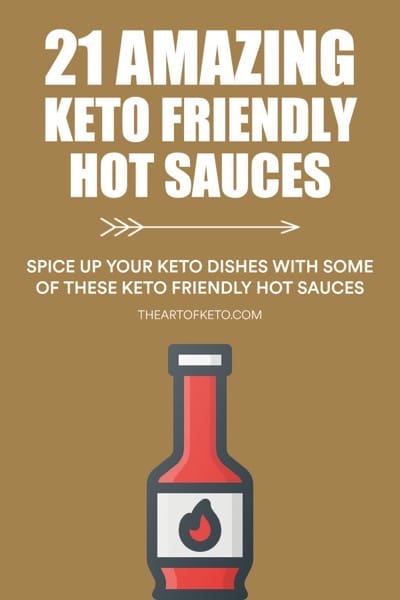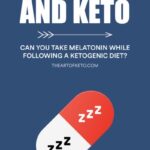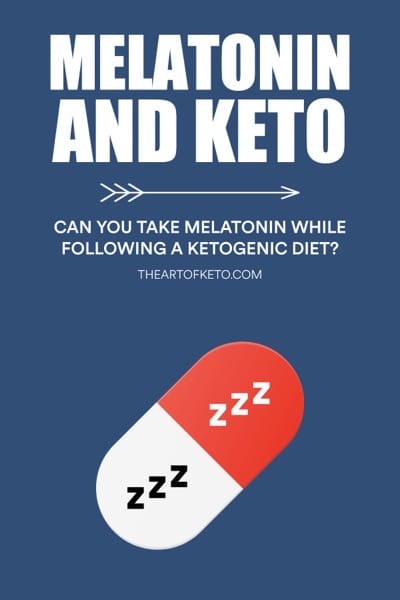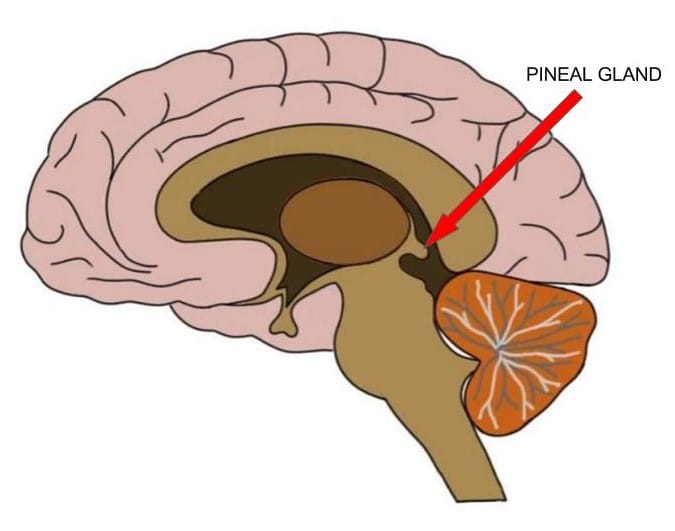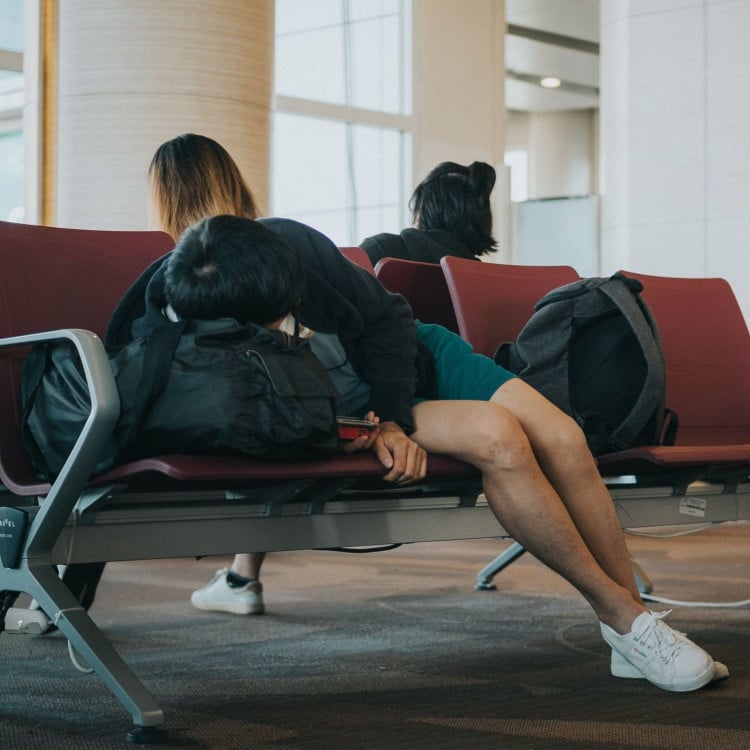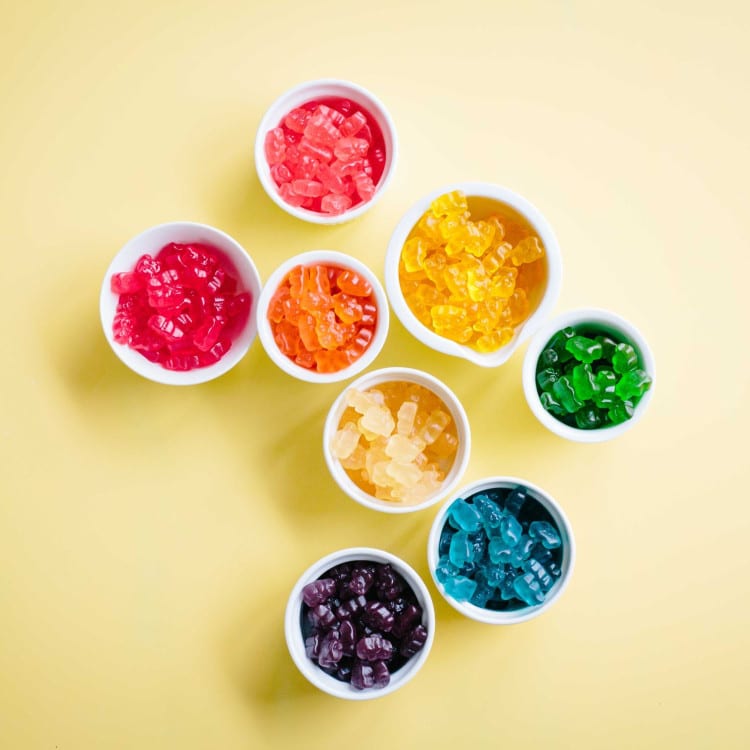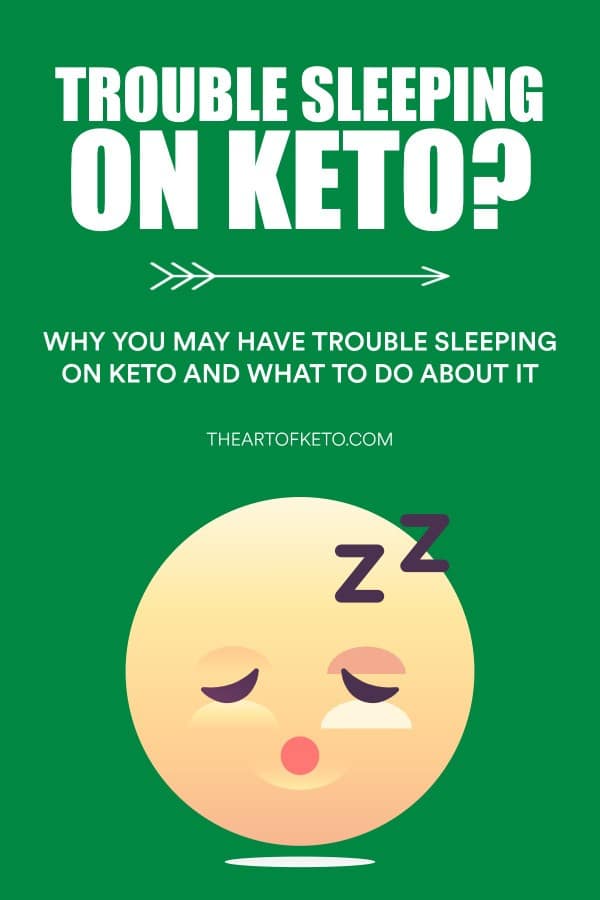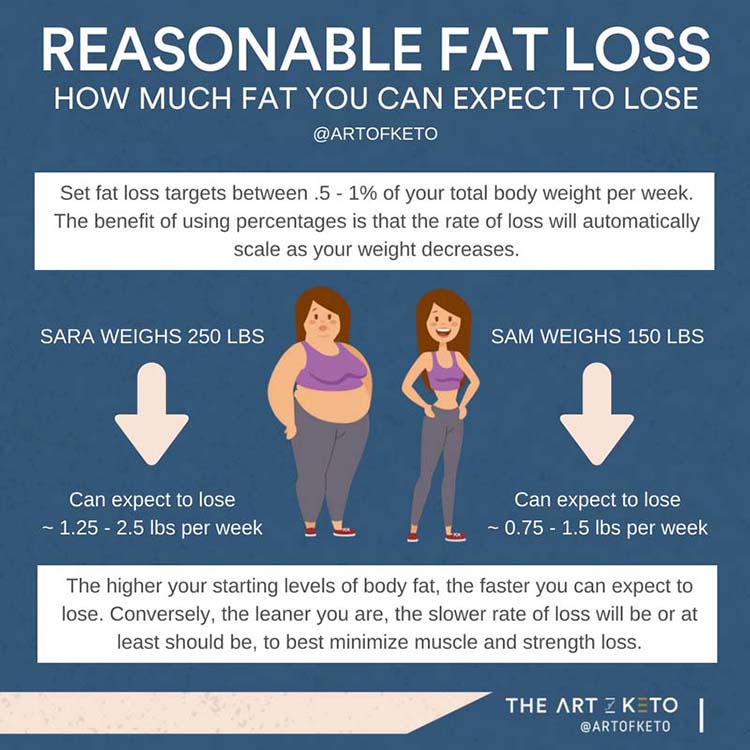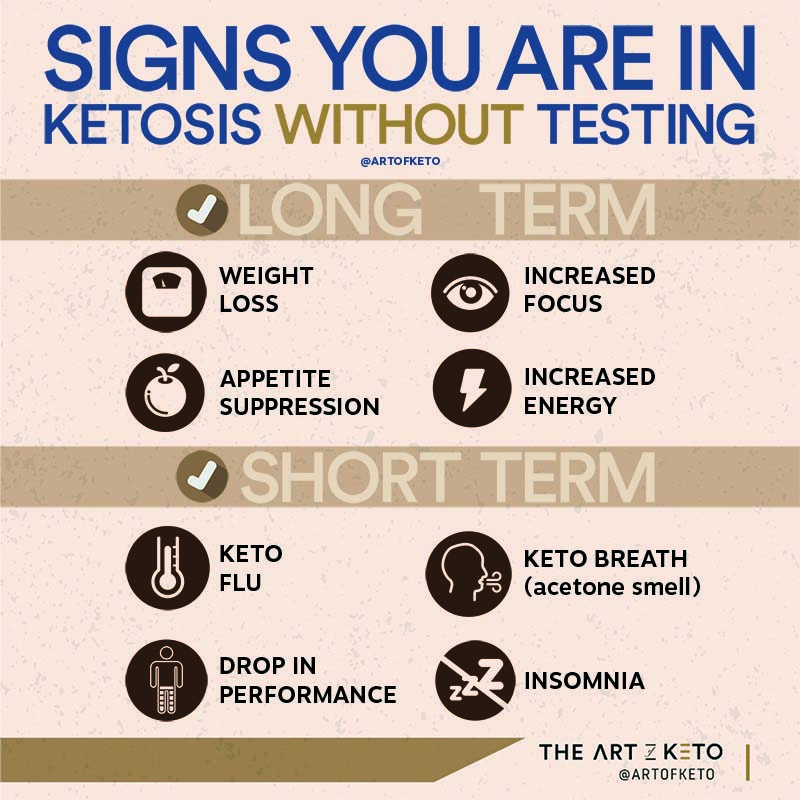What better way is there to start the day than with some bacon and eggs? I'll give you one, keto pancakes!
Or any time for that matter, lol.
While I usually save keto pancakes for the weekends or as a special treat, nothing beats a stack of pancakes with a dollop of butter and a drizzle of syrup.
Figuring out what to put on your keto pancakes can be a challenge, so here are just a few of the different ideas I've found and used myself.
What are some keto pancake topping ideas? Some keto-friendly pancake toppings include:
- Sugar-Free Syrup
- Greek Yogurt
- Berries
- Nut butter (Almond, Peanut, Macadamia) Sour Cream with berries
- Confectioner's Erythritol
- Sugar-Free Jams
- Lemon Curd
- Heavy Whipping Cream
- Sugar-Free Marshmallow Fluff
- Sugar-Free Chocolate Chips
- Butter
- Cream Cheese
- Mascarpone
- Cottage Cheese
- Bacon bits
- Cinnamon
- Coconut
And that's just scratching the surface.
In this article, I'll go over what kind of pancakes are keto-friendly and give you some delicious ways to dress them up and make them tastier.
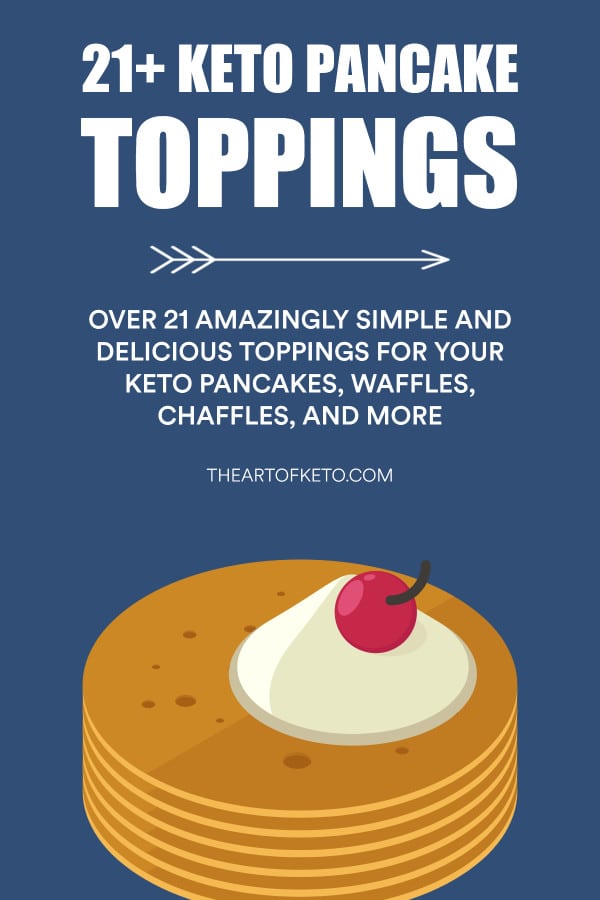
Can You Eat Pancakes On A Keto Diet
While you can't eat your traditional white-flour based pancakes, many keto-friendly recipes are quite tasty and extremely low-carb.
What's even better is that many of these keto pancake recipes can double as a waffle for those who prefer to go that route.
Also, there are many keto-friendly pancake mixes available at your local grocery store and online that are ready-to-go.
A few of my favorite:
- HighKey Keto Pancake And Waffle Mix
- Keto and Co Keto Pancake And Waffle Mix
- Birch Benders Keto Pancake And Waffle Mix
If you're looking for a replacement for your carb-based pancakes, oatmeal, or grits, you have many choices.
How many carbs are in “regular” pancakes?
The average “regular” pancake from a generic recipe or even using a mix like Bisquick or Aunt Jemima will set you back 22 grams of net carbs per 6″ (77g) pancake. 1
Not keto-friendly.
21 Keto Pancake Topping Ideas
Now, the moment you've been waiting for. While it may be hard to imagine what keto-friendly toppings are available, you'd be surprised.
Here are over two dozen keto pancake topping ideas to spruce up your breakfast (or dinner).
What can I put on keto pancakes and waffles?
For starters, almost every pancake toppings you can think of, there is probably a keto-friendly alternative just waiting to be created.
In no particular order…
1. Butter
For those who are purists, topping your keto pancakes with a bit of butter and nothing else can be all that is needed.
2. Sugar-Free Syrups
Almost every major pancake syrup brand now carries a sugar-free variety. If you're looking for sugar-free keto-friendly syrup, I listed 19 of them with their carb counts.
Walden Farms pancake syrup is my personal favorite when it comes to taste and consistency.
3. Nut butter
If you've never smothered some peanut butter or almond butter on a pancake, you're missing out. Almost any nut butter will work, but if you're trying to conserve as many carbs as possible, try to go with macadamia or pili nut butter.
Can't find macadamia or pili nut butter? Get them below.
4. Sugar-Free Jelly
Prefer a bit of a sweeter flavor than a nut butter? Try some sugar-free jelly. Take it up even further and make it a PB&J keto pancake.
5. Fresh Berries
I like to take fresh berries, blueberries in particular, and eat my pancakes plain with blueberries on top. I'll take a few berries and mash them while leaving the rest whole to make a simple berry compote with sugar-free syrup.
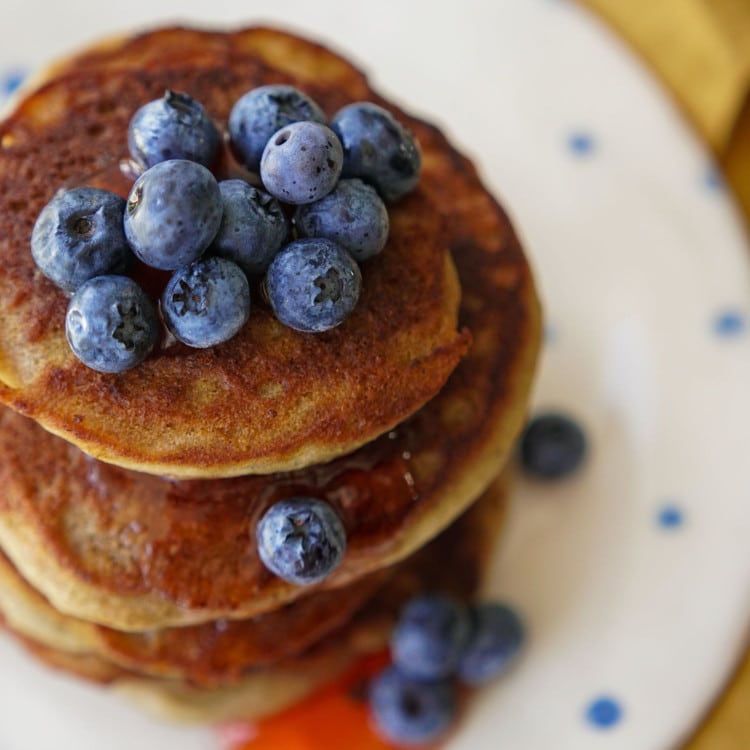
6. Greek Yogurt
Yes, Greek yogurt is keto-friendly. Some brands are more keto-friendly than others, such as Two Good Greek Yogurt or Fage.
Greek Yogurt adds creaminess and some extra muscle-building protein, which also helps with satiety. Try it with some berries and sugar-free syrup for a delicious and hearty breakfast.
7. Cinnamon
Sometimes a bit of cinnamon is all you need. As a child, I used to put butter, cinnamon, and a sprinkle of sugar on my pancakes.
An excellent idea for cinnamon is to make cinnamon butter. Soften your butter, add a dash of cinnamon, and add a packet of your favorite sugar-free sweetener (I like to use either Stevia or Splenda).
8. Pancake Tacos a.k.a “pacos”
While not “technically” a topping, this is a great idea you can use for your keto pancakes, similar to that of pigs in a blanket.
Take your pancake, add a little sugar-free syrup, place a slice of bacon, and add a small amount of whipped cream or reddi whip, then fold it up like a taco.
9. Cream Cheese
A tablespoon of cream cheese has 0.6 grams of net carbs, and a bit less for whipped cream cheese. 2
10. Lemon Curd
If you're a lemon lover, you'll love lemon curd on your keto pancakes. Lemon curd is super easy to make and can be used for a variety of different purposes.
Here is an easy keto-friendly lemon curd recipe.
Photo and recipe courtesy of Every Day Keto Recipes.
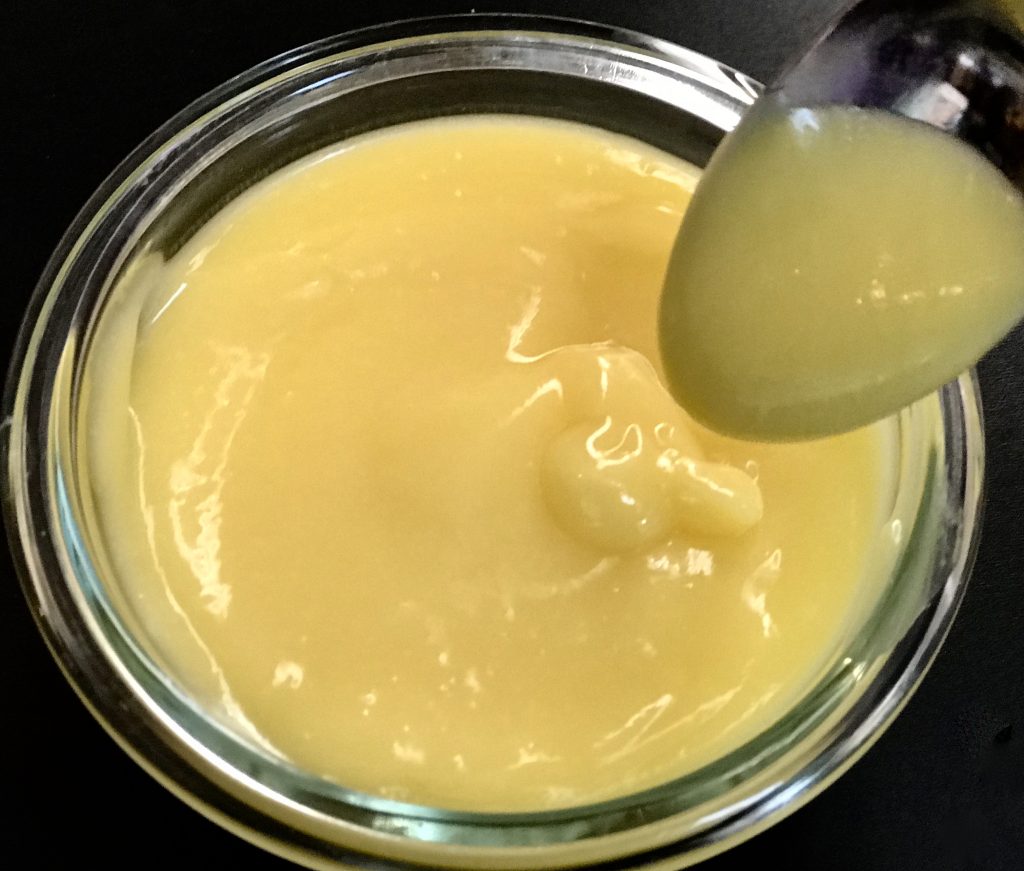
11. Lemon Curd Cream Cheese
You may be sensing a pattern here. Please take the above two ingredients and mix them, maybe throw in a little sugar-free maple syrup, and you have another delicious keto pancake topping.
What's better is that mixing the three ingredients above can serve as a Maple Lemon Cheesecake on its own.
12. Confectioner's Erythritol
If you enjoy powdered sugar, you still can with confectioner's erythritol.
Perfect for a variety of keto-friendly baking uses in addition to serving as a keto-friendly pancake topping.
Purchase Confectioner's Erythritol Here
13. Bacon or bacon bits
Who said pancakes always have to be super sweet? Or maybe you'd enjoy a sweet and salty treat.
Top your keto pancakes with bacon bits and drizzle a bit of sugar-free syrup or soak your bacon in sugar-free syrup and crumble it on top.
14. Sugar-Free Marshmallow Fluff
For a super dessert-like pancake, sugar-free marshmallow fluff is terrific. I use this marshmallow dip from Walden Farms.
Have you ever heard of a fluffernutter? Combine marshmallow and peanut butter and prepare to be amazed. Please don't knock it till you try it!
15. Sugar-Free Chocolate and Chocolate Chips
Melt your favorite keto-friendly chocolate bar, such as Lily's Chocolate, and drizzle it atop your keto pancakes.
Another option is to sprinkle some dark chocolate chips on your pancakes for a bit more bite and crunch.
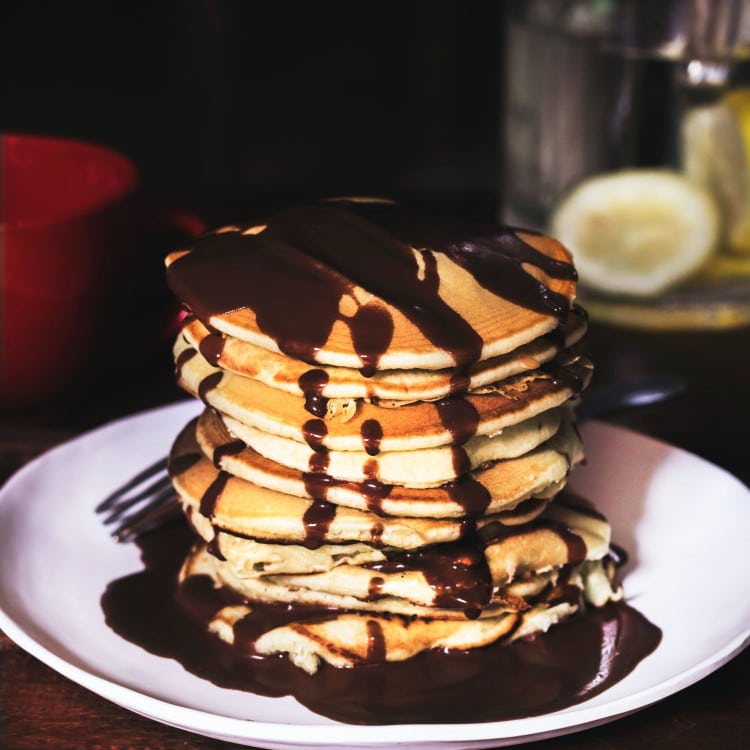
16. Mascarpone
Mix a bit of mascarpone cheese with a little liquid stevia and pure vanilla extract for a decadent treat pancake treat.
17. Heavy Whipping Cream
Whip up some heavy whipping cream and top your pancakes. You can also mash up some berries and mix them for a fruity whipped topping.
18. Cottage Cheese
Cottage cheese makes another excellent high-protein and satiating topping for pancakes.
If cottage cheese is too plain, try mixing in some sugar-free syrup and berries or any one of the other toppings listed above.
19. Caramel Syrup
If you enjoy things on the sweeter side, a bit of caramel syrup instead of sugar-free maple syrup might do the trick.
Take up your caramel syrup up a notch by adding in some coarse salt sprinkled in to make “salted caramel.”
20. Sour Cream with Berries
Take some sour cream and mix with your favorite berries or a bit of sugar-free syrup for a sweet and tangy keto pancake topping.
This topping is similar to the Greek Yogurt with berries, but with fewer carbs and protein with a bit more fat.
21. Salt
Yes, you read that correctly. Salt enhances the flavor of basically EVERYTHING.
For the ultimate in simplicity, top your keto pancakes with butter, salt, and your favorite sugar-free maple syrup.
How To Make Keto Pancakes
You have two options when it comes to keto pancakes; you can either make your own or go the store-bought route.
Below are three of my favorite keto-friendly pancake recipes and favorite store-bought keto-friendly pancake mixes.
Cream Cheese Pancakes
This has to be the most simple keto pancake recipe in existence with only TWO ingredients.
Cream cheese and eggs.
Photo and recipe courtesy of Bare Feet In The Kitchen
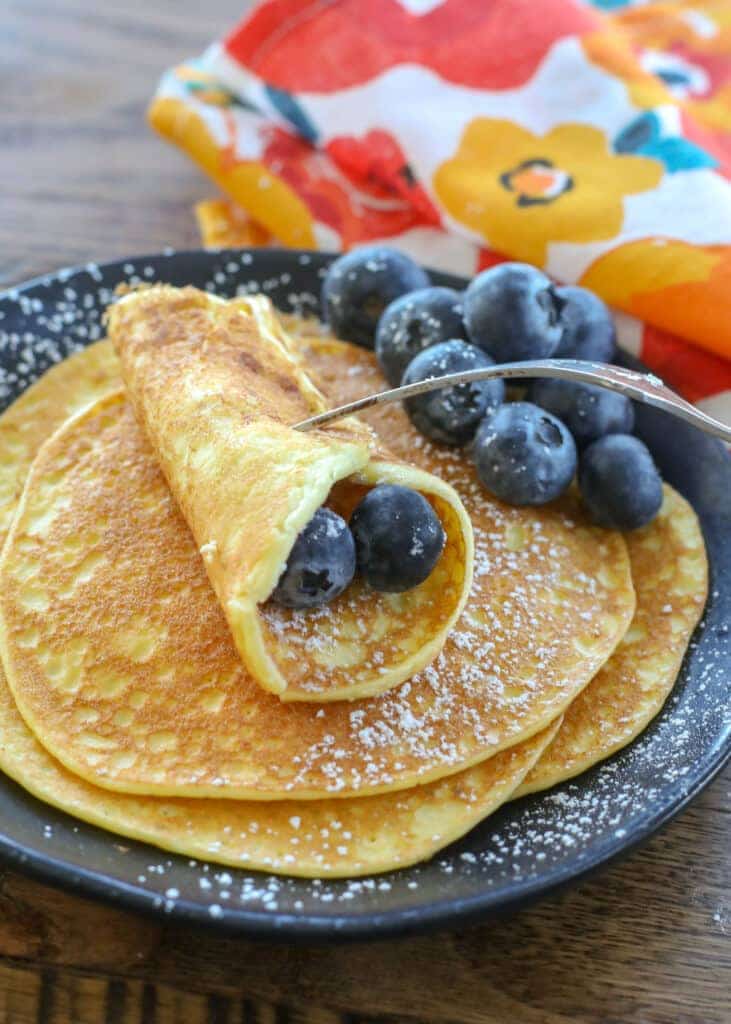
Keto Coconut Flour Pancakes
Most low-carb pancake recipes call for almond flour, but this recipe, in particular, uses cassava or coconut flour. Coconut flour can be hit or miss, so you'll need to be precise with the measurements on this one.
Photo and recipe courtesy of The Big Man's World
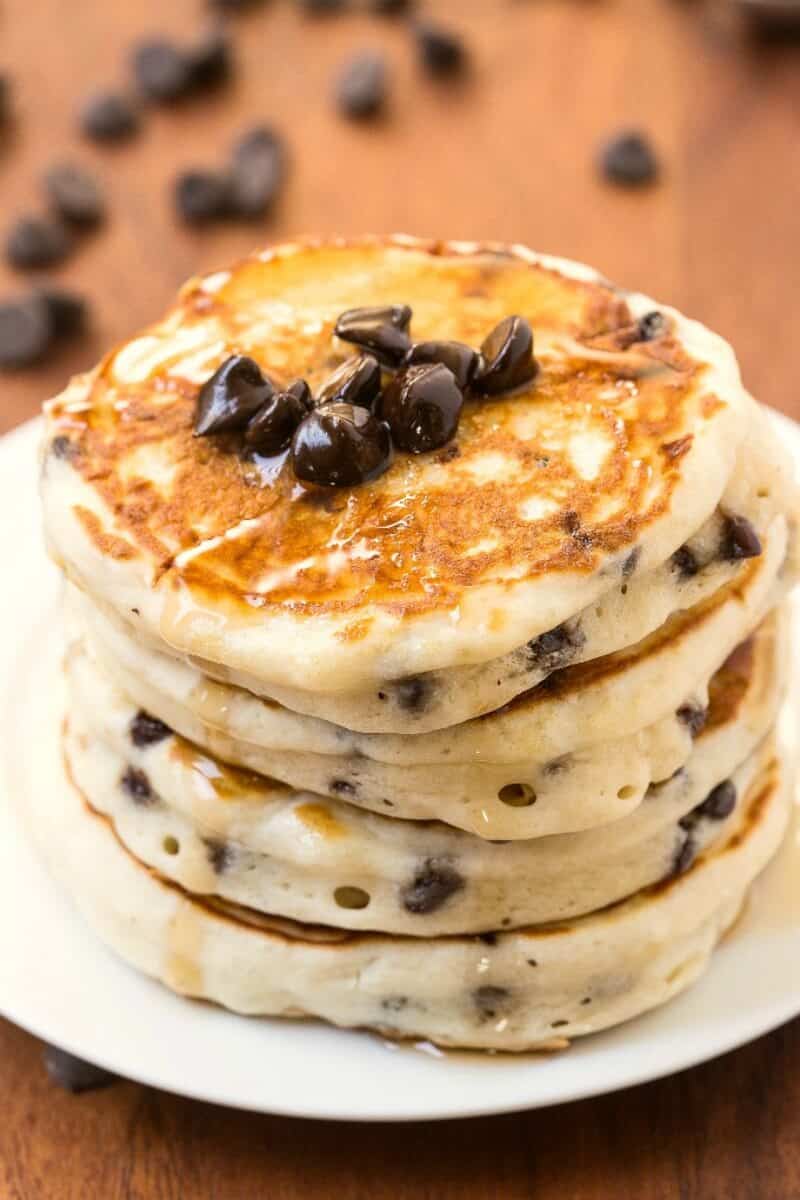
Fluffy Keto Almond Flour Pancakes
Who said you couldn't make keto-friendly pancakes light and fluffy? These pancakes from Oh So Foodie are delicious and easy to make.
The secret to extra fluffy almond flour pancakes is to ensure you're using fresh baking powder. Also, beat your egg whites separately and add gradually to keep the air in.
Follow-Along Keto Pancake Making Video
Prefer to watch someone else make it? Check this video by Low Carb Love.
Best Store-Bought Keto Pancake Mixes
Maybe baking from scratch isn't your thing… I feel you… I do.
Sometimes we want to open the package, mix in an ingredient or two, and get to cooking. Here are a few of my favorite keto-friendly pancake mixes.
- HighKey Keto Pancake And Waffle Mix
- Keto and Co Keto Pancake And Waffle Mix
- Birch Benders Keto Pancake And Waffle Mix
Other Ideas Besides Keto Pancakes For Your Toppings
Now that you have an entire list of what to top your keto pancakes with, you ALSO have a whole list of toppings for many other foods.
Here are just a few ideas you can use these low-carb pancake toppings for
- Unsweetened plain greek yogurt
- Chaffles
- Crepes
- Ice cream
- Noatmeal
- Scones
- Cheesecake
- Keto Bread
Keto Pancake Topping Idea Takeaway
With a bit of imagination, the possibilities of what you can top your keto pancakes with are endless. There's no need to feel deprived on a ketogenic diet with so many great substitutions.
